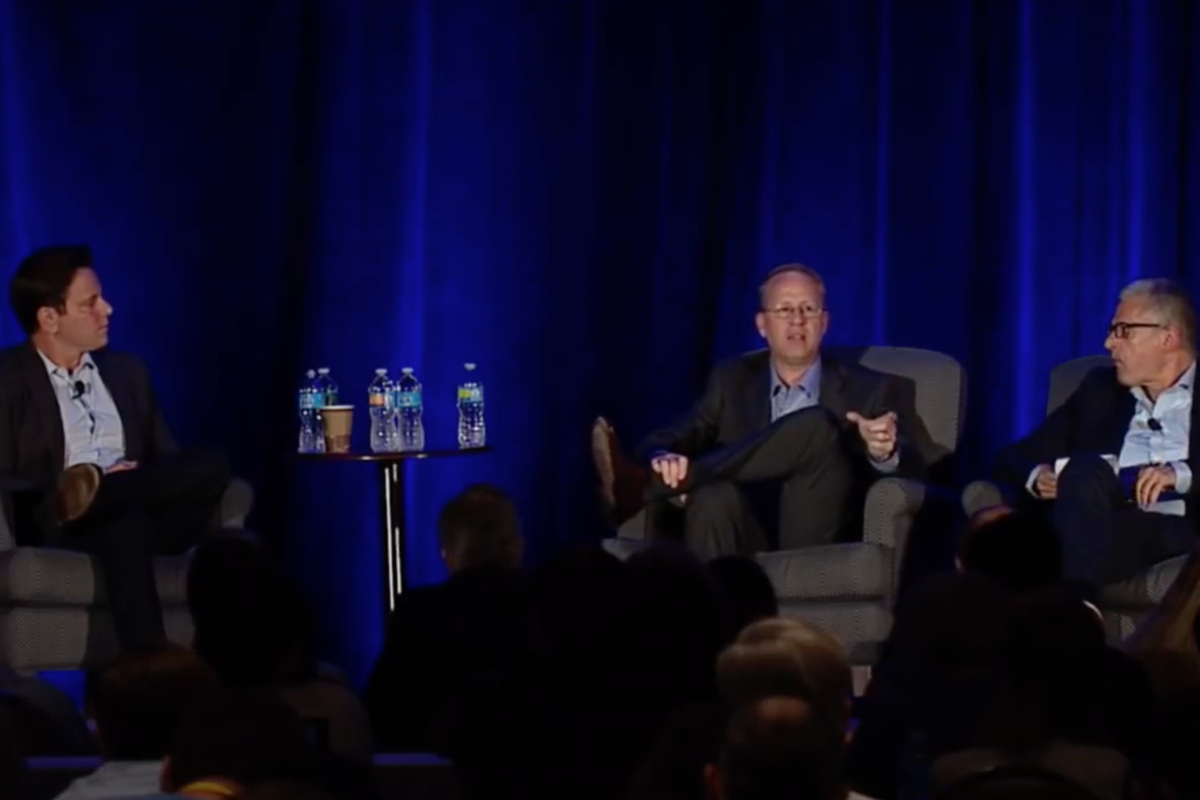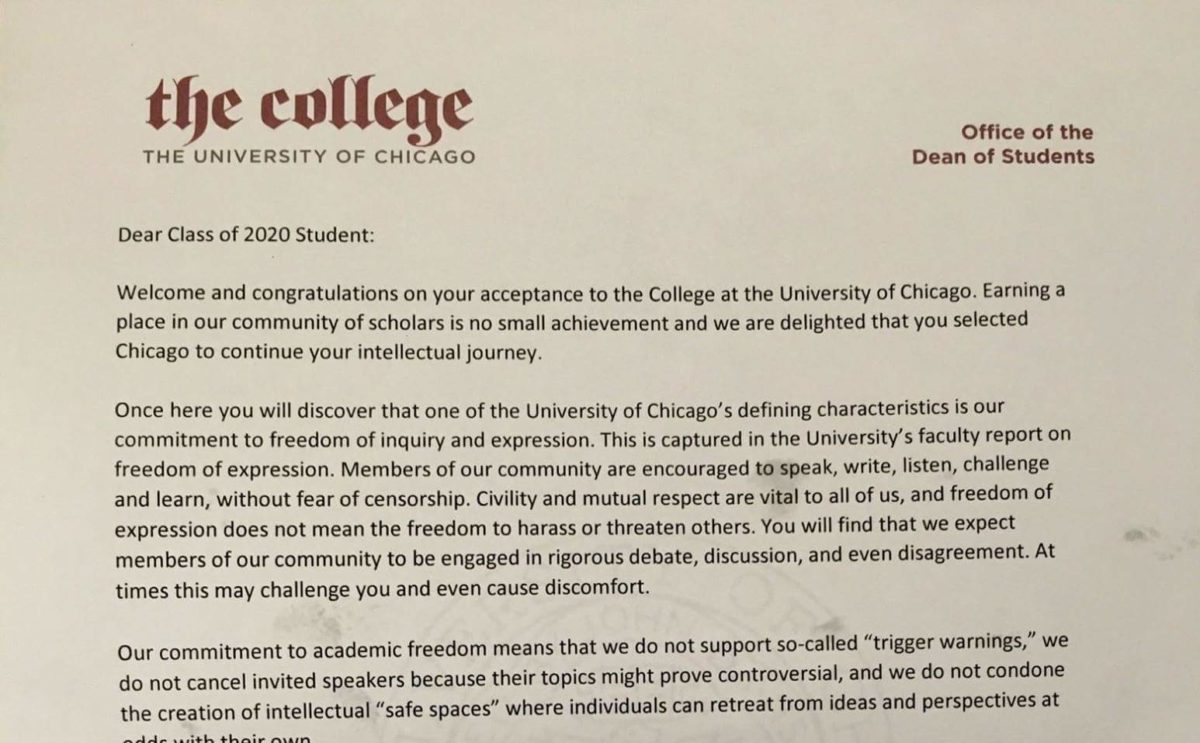By now, no doubt, you’ve heard the story of Ward Churchill, the renegade University of Colorado professor who is under fire for his controversial remarks comparing certain victims of the 9/11 attacks to Nazis (for their role in the global financial system) and advocating more such attacks.
Churchill’s comments, of course, were false and contemptible. They were not, however, unsurprising views for someone in the contemporary humanities. What is more interesting is the debate about American higher education that has been generated by the controversy.
Churchill’s comments caused a justifiable public uproar that was quickly channeled by politicians. Republican governor of Colorado Bill Owens urged the University of Colorado Board of Regents to review Churchill’s employment, arguing that “it is not incumbent upon the University of Colorado to subsidize someone who calls for more 9/11s.”
In response, 200 Colorado professors published a full-page ad in The Boulder Daily Camera protesting these threats against Churchill’s employment and calling on the University to protect “free speech” and Churchill’s “academic freedom.”
It is easy to sympathize with Owens. Why should Colorado taxpayers have to subsidize a man whose views they find abhorrent? The professor’s remarks do help confirm the allegation, long made by conservatives like David Horowitz, that left-wing anti-American views are all too common in American humanities departments.
They also seem to support the notion that something must be done to bring greater ideological “balance” to college campuses. One might be tempted to think that if this means firing a few Ward Churchills and hiring a token conservative or two, so be it.
Although Horowitz objects to Churchill’s views, he himself has argued that firing Churchill would violate Churchill’s right to free speech. Horowitz doesn’t actually think that the way to bring ideological “balance” to the academy is to fire leftists and hire conservatives.
Instead Horowitz endorses a position called the “Student Bill of Rights,” which is championed by a group known as the Students for Academic Freedom (www.studentsforacademicfreedom.org). SAF’s Bill states that “no faculty shall be hired or fired or denied promotion or tenure on the basis of his or her political or religious beliefs.”
To promote “balance,” Horowitz and the SAF urge colleges to require that professors be hired or fired based on their academic qualifications and on their willingness to foster “a plurality of methodologies and perspectives” in the classroom.
Presumably, Churchill should be permitted to spout whatever nonsense he likes outside of the classroom, but while teaching, his lectures should provide students with “dissenting sources and viewpoints where appropriate.” Above all he should not use his course “for the purpose of political, ideological, religious or anti-religious indoctrination.” If he says anything anti-American or anti-anything in the classroom, then he should be fired.
The SAF is having an impact. Bills and resolutions inspired by their “Student Bill of Rights” have been introduced in state legislatures in California, Colorado, Georgia, Indiana, Ohio, and Tennessee, and in Resolution 318 of the U.S. House of Representatives.
The professoriate is worried. The American Association of University Professors (www.aaup.org) has objected to the “Student Bill of Rights,” arguing that it is itself at odds with “academic freedom.” The AAUP erroneously accuses supporters of the Bill of calling for hiring quotas based on political affiliation, a mistake Horowitz quickly rebuts. But it correctly notes that the Bill’s anti-advocacy clause would stop professors from condemning even such things as terrorist violence, a point Horowitz does not address.
What are we to make of this mess? When a professor dares to bring controversial views into the classroom, should we side with his “academic freedom,” or the “right” of students not to be “indoctrinated”?
Whatever is to be done about Churchill and his ilk, all of this rhetoric about the “freedom” and “rights” of professors and students is completely invalid in this context.
Professors have no right to an “academic freedom” that permits them to teach whatever they like, regardless of the views of those who pay their salaries. As Onkar Ghate of the Ayn Rand Institute argues, “Free speech does protect an individual who voices unpopular ideas from governmental force, but it does not require that other citizens support him. If an individual wants others to finance the expression of his ideas, he must seek their voluntary agreement.”
Ward Churchill has the same free speech rights as the rest of us. But our free speech rights don’t give us the right to demand a free microphone and audience at Madison Square Garden–and his don’t give him the right to a job giving him the equivalent.
At the same time, there is also no such thing as a student’s “right” to be free from indoctrination in the classroom. True, no one ought to be forced to subsidize the expression of views they reject. This, however, has nothing to do with an alleged evil of being “indoctrinated.”
No student chooses to attend college on the condition that their professors will never advocate a viewpoint. The SAF, however, thinks that when professors “indoctrinate” their students, they take advantage of their students’ “immaturity” by preaching viewpoints before students have “sufficient knowledge” to form a judgment of their own. Even ignorant students, however, are not helpless pawns: no one is ever “forced” to accept anyone’s opinion just by hearing it.
Each and every one of us is bound to encounter views that we object to, even outside of the classroom. We can do all we like to avoid them, but if hearing them is a condition of getting a diploma, it is always our right to forego the diploma. We can’t demand by right that others alter the conditions on which they choose to offer us diplomas: that would violate their rights. Not their right to “academic freedom,” just their ordinary freedom of contract.
Why all the “rights” rhetoric, then, if this controversy has nothing to do with rights? The answer is that liberal invocations of “academic freedom” and conservative invocations of the “rights” of students are nothing more than political rhetoric designed to entrench their own views in the academy.
Liberals know that “academic freedom” allows them to retain an ideological monopoly on humanities departments, because this doctrine means hiring decisions are to be made by academic peers, without any veto power by people paying the bills. If liberal professors were serious about defending unpopular views like Ward Churchill’s, they would be willing to accommodate views they themselves find unacceptable.
But they aren’t. One need only consider the case of Lawrence Summers, president of Harvard, to see this. In a recent colloquium, Summers dared to raise the question of whether the disparity between men and women in the sciences may be due to innate differences between the sexes. Professors were outraged by this “political incorrectness,” and called for Summers to resign. The AAUP has yet to issue any statements defending him. Liberal professors invoke “free speech” only when their ideology is at stake, not as a matter of principle.
But conservatives are no better. They know that requiring a “balance” of perspectives in the classroom would give them the chance to help end the liberal monopoly in favor of establishing another one. They don’t (yet) want to mandate that only conservative viewpoints be taught, but this isn’t the only way to smuggle in ideology. Conservatives know that all that is required to popularize an underrepresented idea is to give it equal time. But why should conservatives get to dictate to professors what will count as worthy alternatives?
There are many alternatives to liberal orthodoxy besides the typical conservative ones. One can reject the idea that socio-economic factors are destiny without assuming we are products of our genes. One can reject the idea that values are subjective without assuming that religion is their proper source. Indeed one can even reject left-wing pacifism and anti-Americanism and still think George W. Bush is an idiotic disaster! Yet conservative “equal time” lets conservative politicians decide which alternatives must be taken seriously, to the exclusion of others.
Some liberals may agree that using the language of “freedom” and “rights” to protect obnoxious professors and bratty students is inappropriate, and that government should have no say one way or the other about educational content. Still, they might object that beneath this language is a legitimate issue about standards of scholarship: even if a professor doesn’t have a right to teach whatever he wants to on the dime of another, isn’t there a principle that objective scholarship must proceed regardless of its implications for popular prejudice?
Likewise, some conservatives may say that even if a student doesn’t have a right not to be “indoctrinated,” there is still the issue that an objective curriculum must present “both sides of the story” where there is controversy.
Yet even when we step beyond the issue of rights, this debate about scholarly standards continues to offer us a false choice between typical liberal and conservative mistakes.
It’s true, scholarship is objective only if the scholar’s research takes him wherever the facts lead him, whether or not he or anyone else likes his conclusions. And educational material is presented objectively only if teachers present competing views on controversial questions.
Both of these points are fully consistent with each other. A researcher must be guided by the facts, and come to conclusions on the basis of his own best judgment, regardless of whether or not they conform to what is regarded as acceptable. When he presents these views to others, however, a requirement of effective communication is to recognize that his own conclusions are not obvious to everyone, and that they must be presented in the context of opposing views.
This doesn’t mean one shouldn’t advocate one’s own views: advocating one’s views in public, even in the classroom, is an excellent way of improving one’s understanding of them, by seeing how they stand up to scrutiny. But the best way of advocating one’s own views is to compare and contrast them with opposing views. Not everyone has to accept the researcher’s conclusions: they are free to agree or disagree according to how persuasive they find his arguments.
This is how new knowledge is discovered and spread: brave thinkers and researchers develop innovative ideas, and then show how these ideas compare to, and improve upon pre-existing prejudice.
Since these two views about the objectivity and progress of scholarship are actually consistent with one another, how is it that liberals and conservatives, who seem to hold one or the other, come into conflict? The answer is that neither side really gives a damn about the objectivity and progress of scholarship. This can be seen by examining the justifications each group gives for its position.
First, consider the conservative view that competing viewpoints must be given equal representation. According to the SAF “Student Bill of Rights,” the reason competing views should be considered is to “reflect the uncertainty and unsettled character of all human knowledge.”
Hearing this, one is reminded of the classic conservative argument against socialism on the grounds that it is “too scientific,” as well as their argument against evolution on the grounds that it is “just a theory.” Socialism is too awful and evolution too well-confirmed to deserve argumentative tripe like this. The problem with socialism is not that it is “too scientific,” but that it has no rational scientific basis at all, neither economically nor morally. As for the theory evolution, there may be debates about the particular mechanism driving species change, but if anything is a scientific certainty, it certainly is.
Conservatives are interested in mandating the presentation of opposing viewpoints, not because it is a better method of scholarly communication, but because they are against the idea that unaided human reason can discover truths of nature. The “truths” they care the most about impressing upon the young are the ones they deem to be the sacred inheritance of tradition or the holy revelation of a God. Man left to himself isn’t thought capable or worthy of unlocking the real secrets of nature. To them, it is still original sin to eat of the tree of knowledge.
In opposing the conservative view of scholarship, it might at first seem we have an ally in the AAUP, which says of the SAF’s argument that it “is antithetical to the basic scholarly enterprise of the university, which is to establish and transmit human knowledge” and that it “reduces all knowledge to uncertain and unsettled opinion, [proclaiming] that all opinions are equally valid, [negating] an essential function of university education.”
But the AAUP also makes a qualification, admitting that “knowledge is mutable and open to revision.” This is ambiguous. It could simply mean that knowledge advances through history, even though people can make mistakes. But it could also mean that knowledge is relativistic.
Sadly their response to the “Student Bill of Rights” contains no reference to “objective facts,” but it does talk an awful lot about “scholarly and professional standards, as interpreted and applied by the faculty itself.”
That too is ambiguous: only scholarly authorities are qualified to judge what the objective facts in a given subject matter are. Then again, without even making a reference to the importance of the facts, the AAUP could be accused of thinking that it is only the judgments of scholarly consensus that matter, and this would relativize knowledge to the views of the “experts.”
Whatever the framers of the AAUP statement had in mind, David Horowitz reminds us of an important consideration: “This statement is puzzling to say the least. Major schools of thought in the contemporary academy–post-modernism, deconstructionism, and pragmatism to name three–are anti-foundationalist in their epistemologies and build their disciplines on exactly the premise that knowledge is uncertain and even relative. Has the AAUP condemned post-modernism as a threat to scholarship?”
Probably not. And whatever the AAUP thinks, it is clear that the liberal professoriate is no defender of objective knowledge. They don’t think there are any objective facts, and they proceed to fabricate “facts” en masse in the service of their political ends. (See, for example, “Afrocentrist” history, great swaths of environmental “science,” and just about anything in contemporary literary theory.)
If liberals invoke the importance of scholarly standards, it is more likely because of their reverence for the group, rather than for the facts. If things were otherwise, they would be curious to undertake research on the innate differences between the sexes that Lawrence Summers asked about. According to post-modernism, rhetoric about “knowledge” is just one group’s means of asserting power over another. Whether or not liberal professors are post-modernists, at whatever lip service they pay to unhindered scholarship is nothing more than a post-modern power grab.
In the debate between “academic freedom” and “student rights” and the corresponding liberal and conservative split over “objective scholarship,” we are presented with a false choice. In effect, “academic freedom” means the “freedom” to function by permission of the consensus, unhindered by the facts; “student rights” means the “right” to function by permission of personal, usually religion-inspired prejudice, unhindered by the facts. Both views are shamelessly unhindered by the facts.
To change the American university–and American education in general–what is needed is not more funding for professors, nor new government intrusions to “protect” students. What is needed is a change in the basic philosophy of educators and their patrons. We need an alternative to the tradition-worshipping religion of the conservatives, and the post-modernist relativism of the liberals. We need an educational philosophy that defends the objectivity of scientific fact–and one that shows how such objectivity might be brought into the humanities.
Only a philosophy that celebrates the power of the mind to know can motivate students to learn, and professors to advance the frontiers of science. Readers of The Undercurrent should have no difficulty learning which philosophy I think that is.
Valery Publius is a teacher living in the American South.




